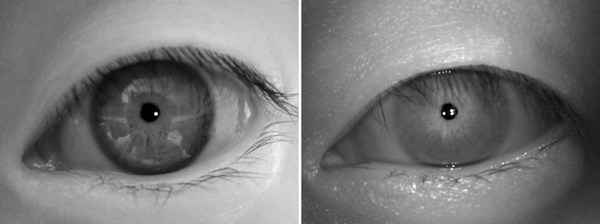Left and right images are taken under identical environments of more thanover 100,000 lux. The left iris image was captured with a conventional iris camera, whereas the right image was with IriTech's outdoor capturing technology integrated camera. The left iris image shows reflections that will likely degrade the matching accuracy, whereas the right image does not have any reflections.
IriTech, a leading iris based identity management technology solutions company and a member of the Texas Instruments Design Network, has developed a new technology to effectively capture and process iris images under direct sunlight of more than 100,000 lux – a move it claims will boost iris recognition technology's convergence with various industries such as the mobileLE devices, wearables and automobiles.
 |
|
Left and right images are taken under identical environments of more thanover 100,000 lux. The left iris image was captured with a conventional iris camera, whereas the right image was with IriTech's outdoor capturing technology integrated camera. The left iris image shows reflections that will likely degrade the matching accuracy, whereas the right image does not have any reflections. (IriTech/LEDinside) |
Until now, one of the biggest impediments for the iris recognition industry to take the technology mainstream was capturing a clean iris image under direct sunlight as the visible light signals are too strong for iris cameras to capture the iris pattern within an IR region created by a LED light source and create reflections in the eye. Conventional solutions required bulky or expensive add-ons or components to eliminate the reflections that make obtaining a clean iris image difficult.
The vendor said the technology does not require major extra hardware components thus additional cost will be minimal if not negligible. "This is finally a viable solution to take iris recognition mainstream, especially at a time when mobile devices and automobiles are embracing biometrics. Our technology will make sure the user experience is not compromised in bright environments," said Daniel Kim, CEO of IriTech.
Apple's release of TouchID has lit the fire of the current hype around biometrics and in India, where the world's largest biometrics project is in progress under the UIDAI — an ambitious plan to issue biometric ID cards to all 1.2 billion residents and to use them in all sorts of everyday transaction. The former UIDAI chief envisions that the next generation of smartphones will have iris cameras built into them. Deployment of iris recognition technology in mobile devices will provide a significant enhancement in security as it has top-notch accuracy and high rate of enrollment.
"Iris recognition was highly utilized by military forces and government institutions, but to make it into the B2C markets such as mobile devices, wearables and automobile, IriTech's 'outdoor capturing technology' will become a requisite," said Kim.












